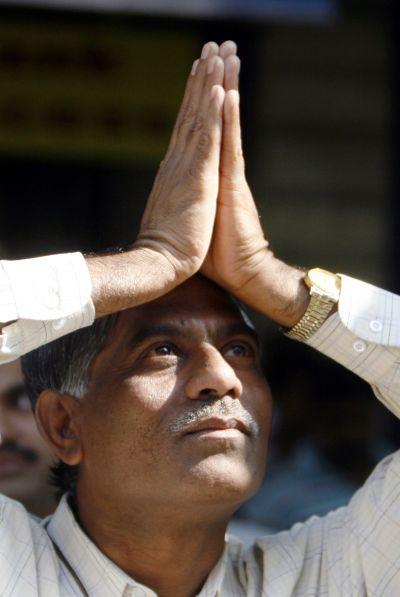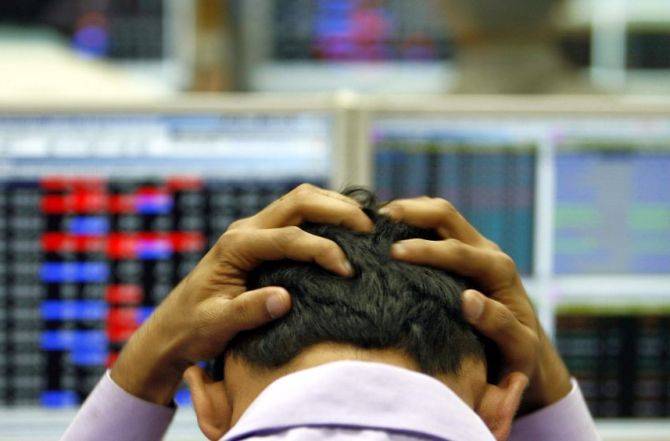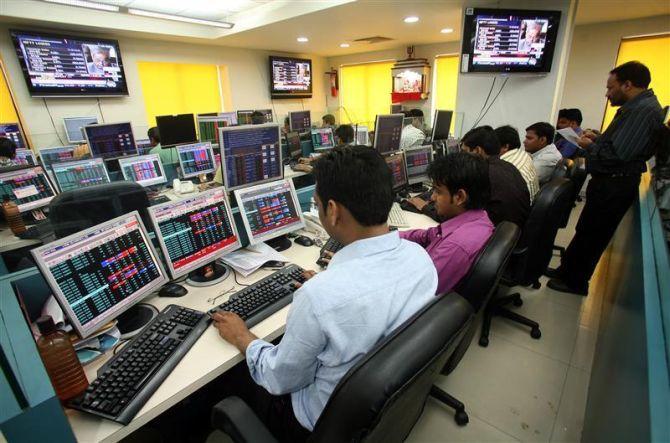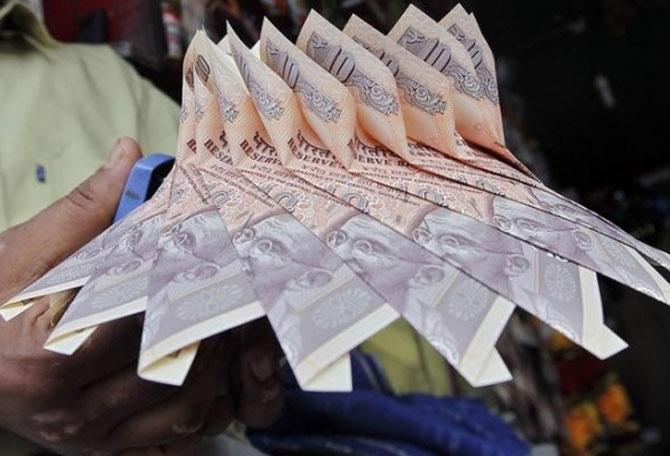Photographs: Arko Datta/Reuters Devangshu Datta
From here till the next government is installed, political equations will play an increasing role in driving perceptions about India, says Devangshu Datta.
Political processes and outcomes over the next 10 days will provide a template for trading patterns through next year’s gigantic exercise, the general elections.
Five states, with a total of 73 Lok Sabha seats, are electing respective assemblies with results due on December 8. Discounting Mizoram with its one Lok Sabha seat, the northern states of Rajasthan (25), Madhya Pradesh (29), Chhatisgarh (11) and Delhi (7) are all key to the National Democratic Alliance’s hopes of winning in 2014.
Assembly scorelines, and how traders respond, will offer valuable pointers to the way the markets behave during the Lok Sabha elections.
In the short-term, Bharatiya Janata Party (BJP) gains will trigger a market uptrend, while Congress gains will lead to corrections.
Several large foreign institutional investors (FIIs) are speculating on the possibility of a Modi-wave and the Assemblies will provide the first data that buttresses or weakens that hypothesis.
Click NEXT to
How election results will impact markets
Photographs: Reuters Devangshu Datta
Traders will not just be interested in direction, of course. They’ll also be looking for a sense of the price-volatility likely to be triggered by elections as the market reacts through the next few sessions to the usual roller-coaster of rumours, actual results and state government formations.
We’ll also get a sense of the relative accuracy of opinion polls. This may help desi admirers of Nate Silver to build predictive opinion polling models for next year.
I don’t personally think that one can just divide Assembly results by seven and get a remotely accurate estimate of Lok Sabha trends. But many market participants, including some otherwise sophisticated FIIs, are likely to do exactly that.
Many market participants have sat on the fence and waited through the latter half of November for these results. Institutional participation was low, although institutions didn’t change stance.
...
How election results will impact markets
Photographs: Reuters
FIIs remained net buyers and domestic institutional investors (DIIs) continued to sell. The overall impact was negative. The DIIs sold Rs 2,190 crore more than the FIIs bought in November.
That pushed the Nifty down by about 2 per cent in contrast to index gains of over 9 per cent in October, when the FIIs bought Rs 5,100 crore more than the DIIs sold.
Politics will probably subsume encouraging Q2 gross domestic product (GDP) growth numbers. Apparently, the economy has bottomed out. Growth in July-September 2013 was at 4.8 per cent, versus 4.4 per cent in April-June 2013.
Of course, inflation did spike and that remains a source of worry for everyone from the aam aadmi to the mavens. The chances are still very good that the central bank will raise policy rates yet again, and soon at that.
...
How election results will impact markets
Photographs: Reuters
The rupee also seems to have settled down a little. However, there were some ominous signals as oil marketing public sector undertakings bought about 30-35 per cent of their monthly dollar needs off the market in mid-month and the rupee fell.
If the oil marketing companies do shift a larger share of their forex purchases back to the market and away from the Reserve Bank of India’s special swap window, there’s likely to be more pressure on the currency.
On the good side of the import ledger, the easing of sanctions on Iran should mean crude prices remain easy and that will definitely be of huge help. The reduction of the chances of a pre-emptive Israeli strike on Iran’s nuclear installations is also good for sentiment.
Market trends have reflected those benign changes to an extent. The information technology sector has seen a weakening as the rupee stabilised. There has been speculative money pouring into depressed sectors such as capital goods and engineering.
...
How election results will impact markets
Photographs: Reuters
Metals and mining have also seen investment. Pharma is now turning into a turbulent zone as the US Food and Drug Administration seems determined to impose higher quality standards on Indian manufacturing facilities. It will be interesting to see what happens in banking, as and when new licences are issued.
On the external front, recent data from the Euro zone have also been encouraging. Inflation is up by about 0.9 per cent and unemployment has fallen, for the first time in three years.
There is a sense that the region may finally be heading out of recession. The European Central Bank (ECB) has a meeting next week and is expected to hold money supply and rates at current levels.
The euro has traded up to a five-year high against the yen and a nine-month high against the dollar on projections of ECB inaction. Japan is expected to continue its quantitative easing programme indefinitely.
...
How election results will impact markets
Photographs: Uttam Ghosh/Rediff
The US is expected to start tapering early in 2014, given stronger than expected American macroeconomic data so, we may see some nervousness in December.
Tapering may lead to cuts in FII allocations. A further acceleration of GDP growth in Q3 could balance that off to some extent. The rupee will stay reasonably weak, and that should continue to reduce the current account, and drive exports.
Faster clearances for infrastructure projects in the last few months could unblock huge sums. If Mr Chidambaram delivers on his promises of further reforms in capital markets, the gas-pricing imbroglio is sorted out, banking licences are issued and telecom spectrum auctions go through smoothly, sentiment should improve.
But from here till the next government is installed, political equations will play an increasing role in driving perceptions about India.
Investors will be unwilling to commit large investments before they know who will be in charge next year. Or indeed, if anybody will be in charge at all, if Parliament is hung once again.
Technically speaking, the Nifty has stayed within a narrow range through November. It has bounced from just below 6,000 levels and hit strong resistance above 6,200.
A breakout triggered by an assembly score of 4-0 in favour of the BJP could push it to a new all-time high, maybe till 6,500. A breakdown triggered by the Congress doing well could also take it down till 5,700 or below.








article